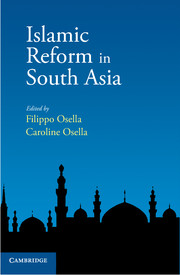Book contents
- Frontmatter
- Contents
- List of Contributors
- Introduction
- Part I Reformist Journeys
- 1 The Equivocal History of a Muslim Reformation
- 2 Islamic Reform and Modernities in South Asia
- 3 Reform Sufism in South Asia
- 4 Breathing in India, c. 1890
- Part II Debating Reform
- Part III Everyday Politics of Reform
- Part IV Reform, State and Market
- Index
1 - The Equivocal History of a Muslim Reformation
from Part I - Reformist Journeys
Published online by Cambridge University Press: 05 January 2014
- Frontmatter
- Contents
- List of Contributors
- Introduction
- Part I Reformist Journeys
- 1 The Equivocal History of a Muslim Reformation
- 2 Islamic Reform and Modernities in South Asia
- 3 Reform Sufism in South Asia
- 4 Breathing in India, c. 1890
- Part II Debating Reform
- Part III Everyday Politics of Reform
- Part IV Reform, State and Market
- Index
Summary
By the middle of the nineteenth century many of India's thinkers were occupied with a single task: to understand and assimilate the modernity they thought had made British rule possible. Until late in the century these efforts were made in the name of religion, with Hindu and Muslim groups founded to reform their respective faiths, and this meant that the idea of modernity had no secular history in India. In this essay I want to look at the way in which Muslim intellectuals who were part of the influential Aligarh Movement came to think about their society as something that had to be reformed and made modern (Lelyveld 1978). Named after the town in northern India that housed its most prominent institution, the Muhammadan Anglo-Oriental College, later Aligarh Muslim University, the Aligarh Movement was also primarily a North Indian phenomenon, but one whose intellectual influence extended much beyond the borders of India. This movement was founded by a group of men who belonged to a class of professional or salaried gentry, known as the shurafa, which had furnished administrators to pre-colonial states and now attempted to do the same for colonial India. Sayyid Ahmad Khan, a minor aristocrat, was the founder and acknowledged leader of the Aligarh group, which called itself a party or school in English, and a movement or tahrik in Urdu, and whose important activities, the college apart, comprised the Muhammadan Educational Conference and voluminous writings, including a journal, the Tahzib-ul-Akhlaq or Refinement of Morals.
- Type
- Chapter
- Information
- Islamic Reform in South Asia , pp. 3 - 25Publisher: Cambridge University PressPrint publication year: 2013
- 3
- Cited by



